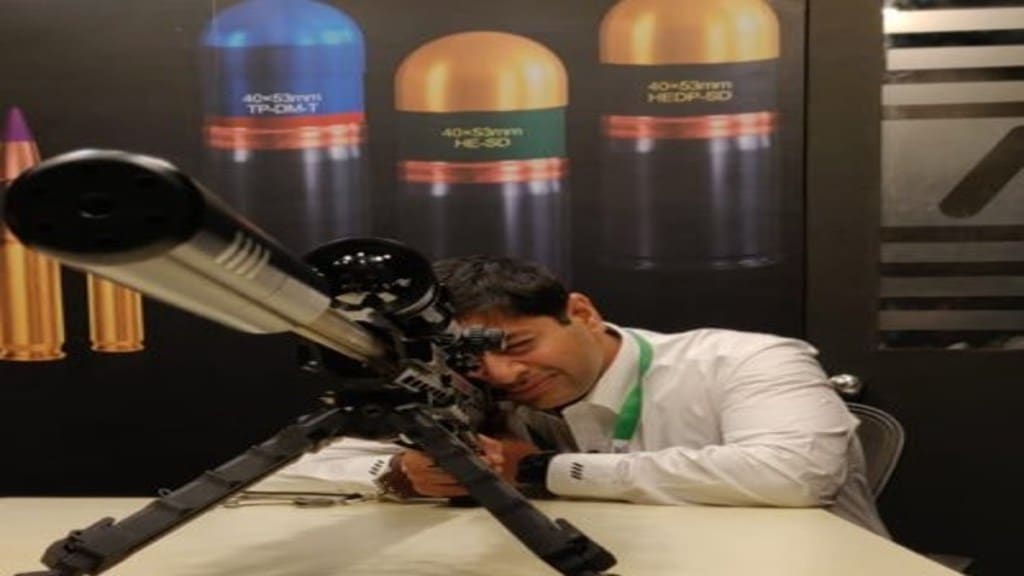India’s decision to procure an additional 73,000 Sig-716 rifles from US manufacturer Sig Sauer Inc. has ignited a fierce debate over the country’s defence procurement practices. At the forefront of this discussion is Vivek Krishnan, CEO of Bengaluru-based SSS Defence, who has voiced strong criticisms of the government’s continued reliance on foreign-made weapons, particularly in light of the much-touted “Make-in-India” initiative. His challenge to the Indian military is not merely a critique but a call to action—a demand for fairness and a level playing field for indigenous manufacturers.
Krishnan’s frustration was made clear in a detailed post on X (formerly Twitter), where he did not hold back in expressing his dissatisfaction. “We’ve heard from the buyer for a long time that ‘we’re not there on metallurgy’ or ‘our designs are behind time.’ I say put an indigenous weapon of ours against a global benchmark in each caliber and test out. Make the results open like real serious armies do,” Krishnan declared. His words underscore a growing sentiment within India’s private defence sector—one of disappointment and determination.
The controversy surrounding the Indian Army’s procurement practices is not new. The decision to order additional Sig-716 rifles follows a 2019 purchase of 72,400 rifles, which were distributed across the Indian armed forces. This latest order has only deepened concerns that the Indian government is sidelining domestic manufacturers in favour of foreign suppliers, thereby undermining the very essence of the “Make-in-India” campaign.
Krishnan’s critique extends beyond just the latest procurement decision. He highlights a broader issue—the Indian government’s apparent reluctance to trust and invest in its homegrown talent. “I wish the govt had not acquired more of these. A private solicitation and insistence on Indian design and content would’ve easily thrown up a contender or many in fact. Testing the same against the in-service system would’ve been rather easy,” he remarked. Krishnan’s comments reflect the frustration of many Indian defence firms that feel stifled by the lack of opportunities to prove their capabilities.
Despite the setbacks, Krishnan’s resolve remains unshaken. He emphasized that SSS Defence is committed to staying in the game and continuing its efforts to develop world-class weapons. “Now that it’s done, what can we do right? Most others would disband. Not us @sssdefence. We made a decision a long while ago to be the most fearless dog in this business. We shall still have a weapon for each caliber and the user to us is still the man in uniform. We will be global,” Krishnan asserted. His words resonate with the determination and grit that have come to define India’s private defence sector.
Krishnan’s statements also touch upon a critical issue—national pride. He questions the erosion of pride in Indian-made products, particularly in the defence sector. “We lost that pride a long while ago by building substandard weapons in the govt controlled space. If anything, the private sector is regaining some of the pride. But making good weapons & getting them accepted is a difficult task,” he noted. Krishnan’s observations highlight the challenges faced by Indian manufacturers in gaining acceptance, both domestically and globally.
However, Krishnan’s message is not solely one of criticism. It is also a challenge to the Indian military and government to reconsider their approach to defence procurement. He advocates for a system where indigenous weapons are given a fair chance to prove their worth on the global stage. “Here’s the challenge – we’ve heard from the buyer for a long time that ‘we’re not there on metallurgy’ or ‘our designs are behind time.’ I say put an indigenous weapon of ours against a global benchmark in each caliber and test out. Make the results open like real serious armies do. Test protocols are clearly defined. It would be the best for both sides. How difficult is that?” Krishnan’s challenge is a call for transparency and fairness, one that seeks to elevate the standards of India’s defence procurement practices.
Bottomline
Vivek Krishnan’s outspoken critique of the Indian government’s defence procurement policies is more than just a complaint—it is a rallying cry for change. His challenge to the Indian military is a bold statement that calls for the recognition and support of India’s indigenous defence capabilities. As India continues to navigate its path towards self-reliance in defence, voices like Krishnan’s will be crucial in shaping a future where Indian-made weapons stand on equal footing with their global counterparts. The question now is whether the Indian government and military will rise to the challenge and embrace the potential within their own borders.

